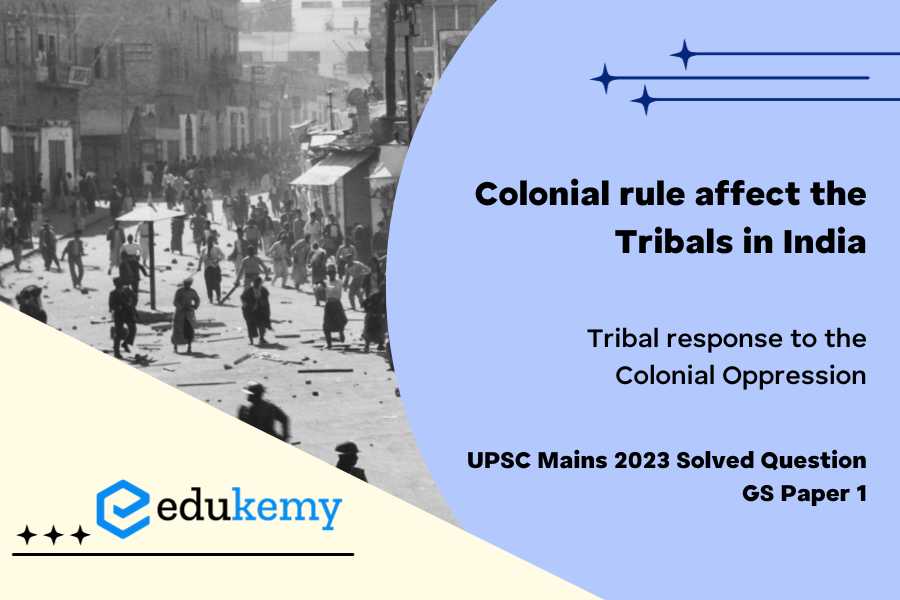UPSC Mains General Studies Paper – 1 Mains 2023
UPSC Mains Civil Services IAS Exam Question Paper – 2023
Contents
Introduction
British colonial expansion led to the unwanted interference in the Tribal regions which instigated various conflicts and violent movements during the 19th and early 20th century.
Body
Impact of colonial rule on Tribals in India:
- Displacement and land Alienation – British policies of oppressive taxes led to tribal displacement from ancestral lands. Example – Santhal rebellion of 1855-56 and Baster Rebellion (1910-1911)was alienated from their land.
- Cultural and Religious Differences – With the colonial expansion, Christian missionaries came to these regions and their efforts interfered with traditional custom of the tribals. This led to cultural alienation and resentment among the tribal population. Example – Tribals way of worshipping nature, sacred groves disassociated with British perspective.

- Sovereignty and Autonomy – British colonial rule threatened the system of self-governance and replaced them with the centralised British administration. The loss of sovereignty was a significant concern for tribal leaders.Example – The Bhil revolt (1822-1857) and Kol revolt (1831-1832) was fought in order to restore their autonomy.
- Social disintegration– Imposition of new laws clashed with tribal customs and social structures. Example- Indian penal code and British legal system vs. Tribal justice systems.
- Protection of Forest rights – through forest acts such as forest act 1865 and Indian Forest act 1878 restricted tribal access to forest and natural resources, further affecting their traditional hunting, Gathering, and agricultural practices. Example – jhum cultivation (Chenchu).
Tribal response to colonial oppression in India:
- Armed rebellion – some tribal communities actively resisted colonial rule through armed uprising and rebellion. Example- The Santhals called the rebellion ‘hui’ meaning a movement for liberation and The Bastar rebellion of 1910 in central India.
- Cultural preservation – some tribes responded to colonialism by making efforts to preserve their cultural heritage and traditions.Example- The ‘Birsa movement’ among the Munda tribe.
- Revival of traditional governance – It was against the British attempts to impose their administrative structure.Example – The Mizo Chiefs conference in the Mizo Hills.
- Participation in national movement – Tribals had an active participation in moments like non-cooperation support for quit India movement and their noticeable role in civil disobedience movement.Example- bardoli satyagraha in 1928 where tribal communities of Gujarat participated against unjust taxation.
- Formation of tribal association- it was formed in order to raise their specific concern.Example- All India trade league, founded by Jaipal Singh Munda. He advocated for tribal rights and welfare.
Conclusion
Hence, the rise of colonial interference in the Tribal regions across India gave rise to the anti British sentiments during the 19th and early 20th century. This helped the nationalist leaders to cater their potential in the journey of national freedom struggle.
In case you still have your doubts, contact us on 8792740517.
For UPSC Prelims Resources, Click here
For Daily Updates and Study Material:
Join our Telegram Channel – Edukemy for IAS
- 1. Learn through Videos – here
- 2. Be Exam Ready by Practicing Daily MCQs – here
- 3. Daily Newsletter – Get all your Current Affairs Covered – here
- 4. Mains Answer Writing Practice – here
Visit our YouTube Channel – here


